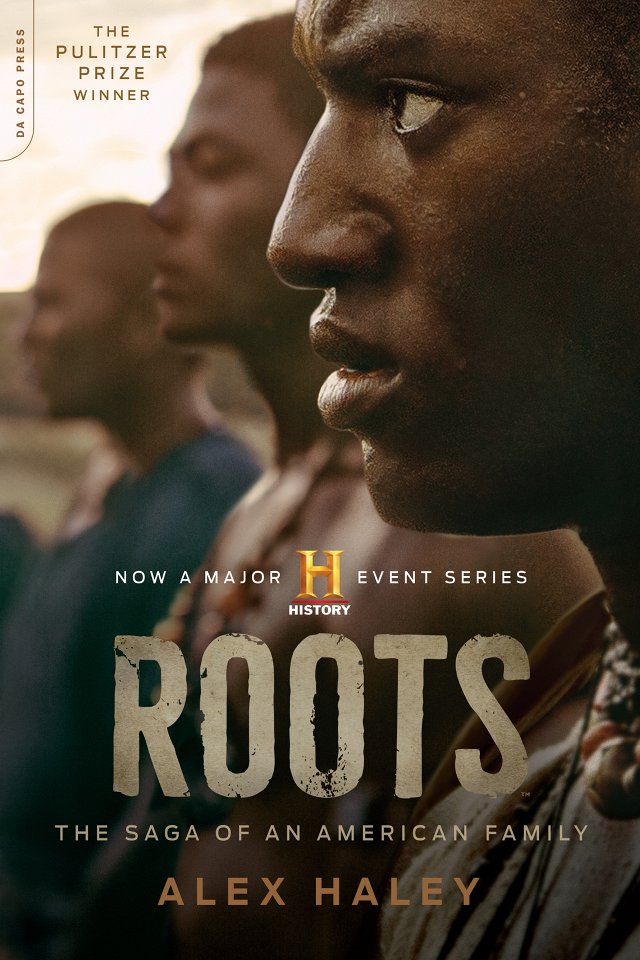Roots and Other Problems
We just finished up the latest selection at Doorstoppers, Roots, by Alex Haley. It had been on my TBR for literally decades and I didn’t remember ever having read it. If you think that’s strange, I once read about two-thirds of Anita Shreve’s Sea Glass before I remembered it was a repeat, so…. Within minutes of posting the choice, one of our members said they would be skipping it because of “the plagiarism.” What is the controversy surrounding Roots, and what can we or should we do with Roots and other problems? That is, what to do with problematic works of art or the artists themselves?
Cultural Juggernauts
Roots, the book, and Roots, the TV mini-series, were cultural juggernauts in the Seventies. The book won The Pulitzer Prize (no, the award wasn’t rescinded). Even after almost 50 years, the finale of the mini-series ranks as one of the most-watched episodes in the history of television. The series was also responsible for launching or solidifying the careers of a Black pantheon of actors, including LeVar Burton, who calls Alex Haley “a great man.” He traces his roots as an actor, as it were, directly to his role in Roots. Can you imagine a world without Reading Rainbow? Uh, no, and who would want to? So what gives?
Plagiarized
Haley plagiarized many sections of the book. Harold Courlander, an anthropologist, folklorist, and novelist whose book The African was published in 1967, alleged in a 1978 lawsuit that Alex Haley copied 81 passages. An expert witness for Courlander stated that “the evidence for copying…is clear and irrefutable.” As an expert witness it was his job to find evidence that would support Courlander’s claims. However, the judge agreed and worked to get the parties to settle, which they did the day before the case went to final summation (see the Wikipedia page, above, for references).
Since I’m not up for doing some kind of side-by-side analysis of The African and Roots, I’ll take what the judge, who read both books, said at face value. Haley admitted as part of the settlement that certain passages “had found their way into” Roots. In my opinion, he seemed to conveniently throw his research assistants under the bus, claiming that the sources of the passages hadn’t been included in research materials they provided him. At least one scholar has noted that four or five passages are almost verbatim. You can see a few examples on Courlander’s Wikipedia page (above).
“Faction” and Jubilee
Along with the plagiarism issues, Haley claimed to have confirmed his family tree, going back seven generations, in The Gambia. While he did travel there to do research, Haley himself called some of his story “faction.” Finally, Margaret Walker, who wrote the 1966 novel Jubilee, a story about the child of a white plantation owner and a black enslaved woman on his property, also filed a plagiarism suit against Haley. The court dismissed it, though. Walker had strong opinions about both Haley and the lawsuit dismissal. You can find a short synopsis of those here.
Monsters
I started working on this post at the beginning of February. As I debated what to do about the book selection, I remembered I had heard about a book which addressed exactly this type of problem. A quick search led me to Claire Dederer’s Monsters: A Fan’s Dilemma. In it Dederer grapples with what to do about some of her favorite “monster” creators. I highly recommend it. Incredibly intelligent, she obviously spent a lot of time cogitating on everything. Prior to reading Monsters, I had already made my own mental list of problematic people. Some natural overlap with Dederer’s list exists, and I’m acknowledging now that the “monsters” heading up above is an undisguised nod to Dederer.
One obvious inclusion is Roman Polanski. I don’t know his films well enough to discuss them in any in-depth way, but I’ve liked what I’ve seen. I’ve always felt bad for him and the troubles he’s had in his life (Holocaust survivor; pregnant wife Sharon Tate murdered by Charles Manson’s followers). I’m not excusing his behavior. But I would still watch his movies. In 2023 I read Samantha Geimer’s book The Girl: A Life in the Shadow of Roman Polanski. Read this book. Go to the source and listen to her story, because she was and is the person at the heart of it all.
Cormac McCarthy
The first person who came to mind after I read the post in our discussion room was Cormac McCarthy, probably because he’s been a recent subject of controversy. I love his writing, and have spent a fair amount of time gushing about The Passenger. The Road is one of my all-time favorites. But McCarthy, who died in 2023, started getting a lot of posthumous flak last year for having an affair with the young woman who turned out to be his muse, Augusta Britt. Britt has said she “loved him” and “he was [her] safety” at a time when her life was horrible. While people clamor to heap criticism on McCarthy, Britt herself, like Geimer, has her own story to tell, and maybe people should read it before they start railing. I will continue to read and reread McCarthy’s books.
Fraudsters
Two other people popped into my head while pondering all of this: Carlos Castaneda and Lance Armstrong. What could they possibly have in common? They were fraudsters. Carlos Castaneda’s Don Juan series of books, huge bestsellers in the Seventies, have sold tens of millions of copies. Castaneda claimed to have met a spiritual leader, Don Juan, and the books supposedly recounted Don Juan’s teachings. These claims have been discredited. Worse, Castaneda had a cult-like following, and at least one of his female followers died under mysterious circumstances. While I’ve never read any of Castaneda’s books, a lot of people really admired and trusted him. What do they do with that?
Lance Armstrong
Lance Armstrong, though, is a person who I did admire greatly. I can still remember specific moments from the Tours de France he won back in the late Nineties and early Aughts. I watched all of those scenes, thrilled the whole time. It was a kind of “Golden Age” of cycling (other than the time period that included Greg LeMond, still my favorite). That is, until we found out he and others on the USPS cycling dream team engaged in various illegal and unsportsmanlike conduct. As he continued to deny, deny, deny, one by one teammates and others found themselves shredded. Floyd Landis and Tyler Hamilton are the two that come to mind.
I just did not want to believe that he or they had cheated! His story was so inspirational and he did so many good things related to raising cancer awareness. How could he have done such shitty things? Upset and disillusioned, I got rid of my copy of his book. In the end, I should’ve listened to Greg LeMond from the outset, who maintained all along that something was rotten in Denmark — er, France.
So What About Roots?
So what about Roots? Once I saw the other book club member’s post, I was in a difficult position. Should I change the selection? That didn’t feel right. I didn’t want to dump the book without looking into the situation and thinking about it, so I decided to leave it. I responded to the commenter by saying that I wanted to read the book and see how it stood on its own. Of course, though, after reading the plagiarism comment, it was basically impossible NOT to think about that every time I picked up the book. As Dederer states, having a clean slate is impossible if you decide to interact with certain works of art.
As a story, some parts of Roots are excellent, in particular the section when Kunta Kinte is taken, up to when the story shifts focus to his and Bell’s daughter. The beginning of the book is interesting, but extremely slow. I switched to the audiobook, expertly narrated by Prentice Onayemi, when I couldn’t gain momentum. Kunta and Bell disappear abruptly from the narrative, which is the book’s biggest negative. Maybe Haley wanted to highlight the uncertainty experienced by families in those situations, but it’s not a choice I liked. However, Kunta Kinte is an excellent character, really admirable, despite his judgmentalism!
A Cheater’s Tide?
They say a rising tide lifts all boats, but what if it’s a cheater’s tide? Or that of a monster or fraudster? Should we abandon ship? What if the person who inspired the rising tide inspired others to do good? Shouldn’t that count for something? What if those monsters and fraudsters simply make you happy? Neither monster nor a total fraudster, Haley and Roots are difficult to place. What if Roots speaks to you in a way that no other book ever has? Should we focus on the positive rather than the negative, the good that Haley, Armstrong, and others accomplished?
Desire to Engage
One way to reconcile people’s less-than-ideal behavior with our desire to engage with their creative works is to support the counterparts of the monsters and fraudsters, as I’ve already alluded to. In the case of Haley and Roots, I can read The African and Jubilee. Courlander’s book is difficult to find, but I was able to order a used copy. It might also be available through the Internet Archive. Jubilee is available here, and in a 50th anniversary edition, no less! You can also learn more about Margaret Walker, and hear her read excerpts from her book in the video below.
Remain Cognizant
Notice what’s missing here? I haven’t said I wouldn’t read Roots because of a controversy. Yes, I got rid of Armstrong’s book in a moment of disillusionment, but I read and enjoyed it. I might even read it again, keeping in mind what I now know. I wouldn’t buy it again. If I were interested in Carlos Castaneda’s books, I would read those, too, even though it would be difficult to set aside what I’ve since read about him. What I’m saying is that I hope to remain cognizant of various issues surrounding the creations, and I prefer an additive rather than a reductive approach. Does this mean I’m condoning bad behavior? Absolutely not.
Honorée Fannone Jeffers, author of another Doorstoppers selection, The Love Songs of W. E. B. Du Bois, addressed Roots in response to a comment another blogger made about the book. She talks about how much Roots has meant to her and other Black Americans, but points out that it is not okay to plagiarize (which it isn’t). She also recognizes the difficulties in writing about histories passed down through the tradition of oral storytelling, which adds another layer. I like her reasoned approach, which is the same approach I’m trying to have.
Thoughtful Reflection
I guess what it boils down to is: I want to try to inform myself, then decide. We each have our own line that we won’t cross when it comes to interacting with someone’s creation. Hopefully, we determine what that line is after a period of thoughtful reflection. Without excusing any bad behavior by monsters or fraudsters, I think, too, that forgiveness is a difficult quality to find lately. That’s a pity.
If only Haley had acknowledged and thanked Courlander for the intertextuality (and, of course, NOT copied). If only Lance Armstrong hadn’t cheated. You might as well wish for people never to do bad things or make mistakes. That’s too much to put on anyone.
Where Do You Come Down on These Issues?
Having wrestled with all of this for the last month, I don’t regret leaving Roots as our selection, nor do I regret reading it. If I had known more about the problems, I probably would’ve recommended Jubilee instead (because it’s a doorstopper, meanwhile The African is not). Where do you come down on these issues? Who are your monsters and fraudsters? Have you read Roots? Seen the mini-series or the remake? Ever felt let down by one of your favorite artists/creators? Let me know in the comments below.
Pulling at Threads is my occasional newsletter. It always accompanies my blog posts. If you want more of an “insider’s” view on what’s happening in my reading and writing life (or just to get notified of the latest post), you can sign up here.



